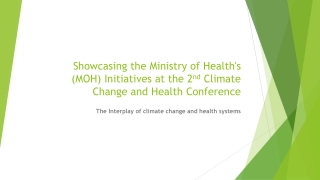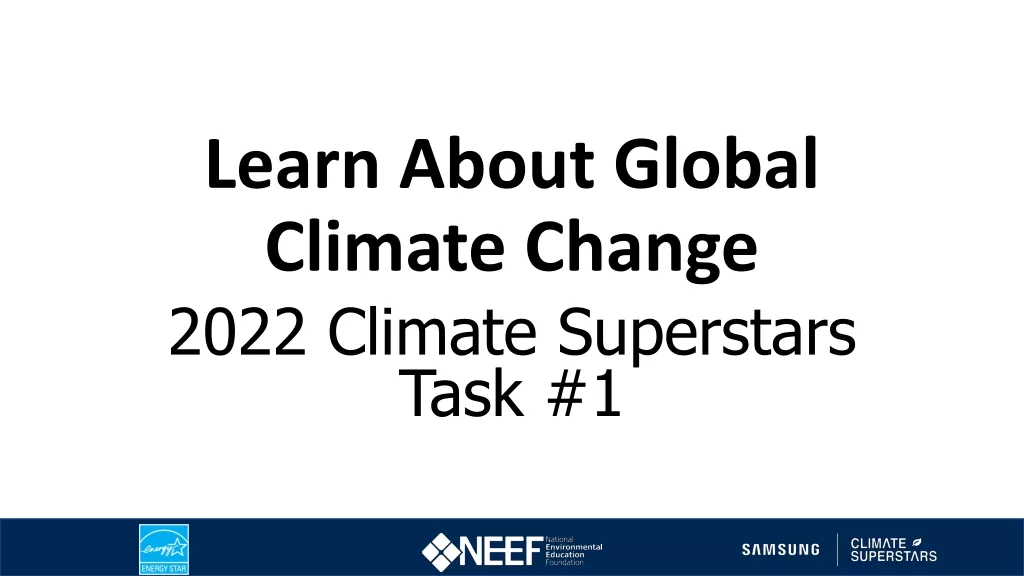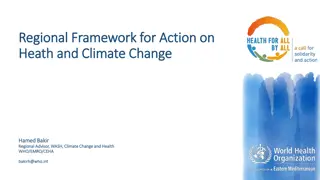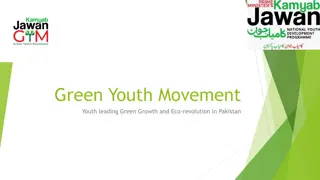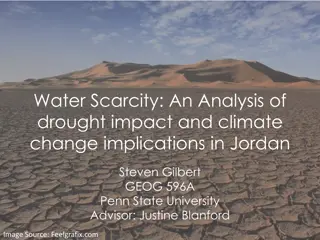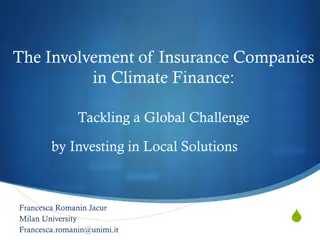
Impact of Climate Change on Mental Health: Understanding Solastalgia and Eco-Anxiety
Climate change contributes to adverse mental health outcomes, with concepts like solastalgia and eco-anxiety emerging. Learn how extreme weather events affect well-being and discover vulnerable populations. Explore the implications of acute and chronic effects of climate change on mental health, highlighting disrupted routines, fear of environmental doom, and feelings of powerlessness.
Download Presentation

Please find below an Image/Link to download the presentation.
The content on the website is provided AS IS for your information and personal use only. It may not be sold, licensed, or shared on other websites without obtaining consent from the author. If you encounter any issues during the download, it is possible that the publisher has removed the file from their server.
You are allowed to download the files provided on this website for personal or commercial use, subject to the condition that they are used lawfully. All files are the property of their respective owners.
The content on the website is provided AS IS for your information and personal use only. It may not be sold, licensed, or shared on other websites without obtaining consent from the author.
E N D
Presentation Transcript
Solastalgia & Eco-Anxiety Authors: Charles Moon, MD, Social Pediatrics Residency Program, Department of Pediatrics, Montefiore Medical Center Sean Jau-Ren Yancey, MBBS, Psychiatry Residency, Department of Psychiatry, SUNY Downstate Faculty Advisor: Lisa Fortuna, MD, Professor of Psychiatry and Behavioral Sciences, University of California San Francisco Updated: July 30, 2022
Learning Objectives: 1. Describe how extreme weather events impact mental health outcomes 2. Understand the concepts of solastalgia and eco-anxiety and how they may contribute negatively to well-being 3. Describe how subacute climate events impact mental health 4. List populations of patients who are most vulnerable to adverse mental health impacts from climate change 5. Identify and provide resources for patients struggling with climate-related mental health issues
Climate Change & Mental Health Climate Change: - Acute extreme events & chronic changes can act alone and in concert, leading to a wide spectrum of adverse mental health outcomes Clayton et al. Curr Environ Health Rep. 2021.
Definitions: Solastalgia & Eco-Anxiety Solastalgia: a sense of loss, especially relating to a place that is important to that person, secondary to irrevocable change in a person s lived landscape due to climate change - Examples: destruction of one s environment by wildfires, coastal erosion, or rising sea levels Ecoanxiety: a chronic fear of environmental doom ; worry about the future for oneself, children, and later generations due to watching the slow and seemingly irrevocable impacts of climate change unfold - Can be experienced as fear, anger, guilt, feeling of powerlessness, exhaustion Clayton et al. American Psychological Association. 2017.
Populations of Concern: Vulnerability and Mental Health Severely mentally ill Low income Homeless Outdoor workers Elderly, frail, and medically ill Children Peripartum women Indigenous populations Immigrants People of color Source: (Benevolenza, 2019)
Vulnerability and Mental Health: Examples Severe mental illness Disrupted heat regulation Poverty More difficult to adapt to changes Dependant on disruptible services Children Interrupted routine and school Separation from caregivers Parental stress More likely to have trauma-related symptoms Indigenous populations Increased family stress Higher alcohol and drug usage Amplified prior trauma Increased potential for suicidal ideation Source: verywellmind.com
How to Provide Resources and Solutions Engage with patients psychologically Reduce psychological distance, support connections Promote social norms and group experience Mitigate loss aversion, identify potential gains Reduce feelings of powerlessness, support action Three insights from the literature #1: There is no one correct or best way of communicating about adaptive coping with climate change #2: Practitioners must attend to variability in both climate stressors and message/intervention recipients #3: Individuals exist in communities and ecosystems with resiliencies that are interconnected
Resource lists for individuals and communities Resources to Build Community Resilience: Resources For Individuals or to Support Individual Resilience: Centers for Disease Control and Prevention BRACE Program Coping With Climate Change Distress Community Emergency Response Teams (CERTs) from FEMA Climate Resilience Network Project Inside Out Public Health Adaptation Strategies for Climate Change from EPA Good Grief Network (a 10 step program for resilience building) U.S. Climate Resilience Toolkit The Climate and Traditional Knowledges Workgroup (CTKW) Facing It: A podcast about love, loss, and the natural world from Jennifer W. Atkinson, PhD Community Resilience Learning Collaborative and Research Network

